Matsumoto Castle- Visiting an Original Japanese Castle
Purchases made through links earn us a small commission, at no extra cost to you.
I’ve visited several castles in Japan but one that stands out in terms of beauty, historical interest, and visitor experience is Matsumoto Castle.
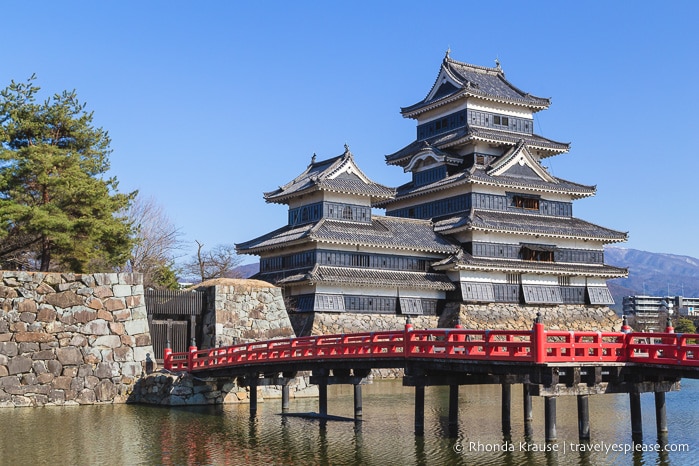
As a National Treasure of Japan, Matsumoto Castle is one of the finest of Japan’s 12 original castles. Its towering black donjon, elegant scaffolds, and engraved roof tiles blend strength with grace, making Matsumoto Castle one of the most beautiful original castles in Japan.
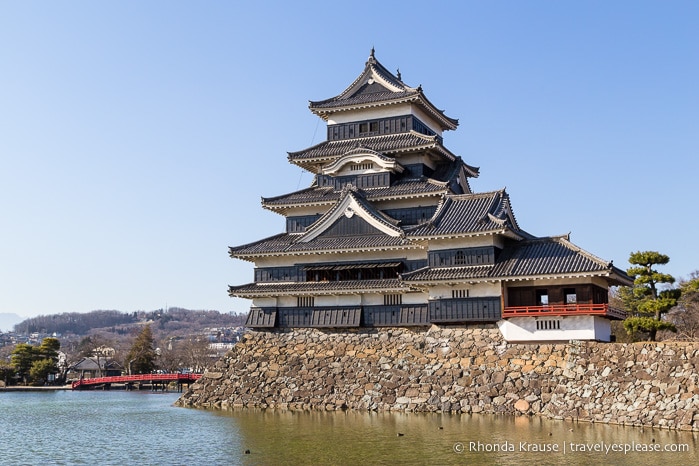
Add in a backdrop of mountains, wide moat complete with swans, a vermilion bridge, and it was a picturesque scene I quickly fell in love with!
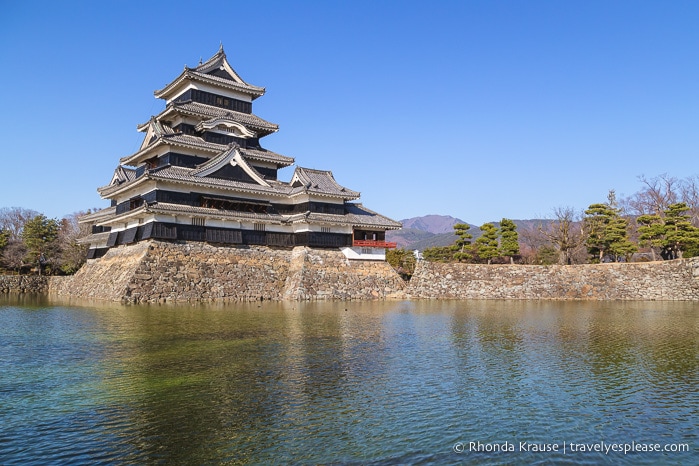
Before I share my experience visiting Matsumoto Castle, here’s a brief history of the castle and some interesting notes about its construction.
About Matsumoto Castle- History and Architecture
The origins of Matsumoto Castle date back to a period of civil war during the Eisho Era (1504-1521). Known then as Fukashi Castle, it was renamed to Matsumoto after being captured in 1582. The years that followed saw Matsumoto Castle be transformed into how it appears today.
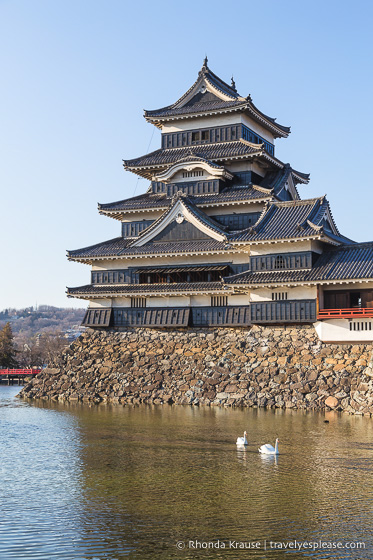
The main keep (donjon) was built between 1593-1594, making it the oldest castle keep in Japan. Later, a second, smaller donjon was built, along with a roofed passage connecting it to the main keep. These towers were fortified with stone dropping windows (ishiotoshi) to stop invaders from climbing the walls, rectangular openings for shooting arrows (yazama), and square holes for firing muskets (teppozama).
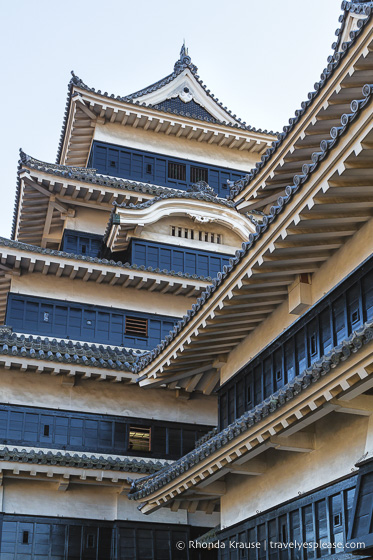
Once peace in the region was achieved, a third turret and the Moon Viewing Room were added, completing the five connected structures of Matsumoto Castle.
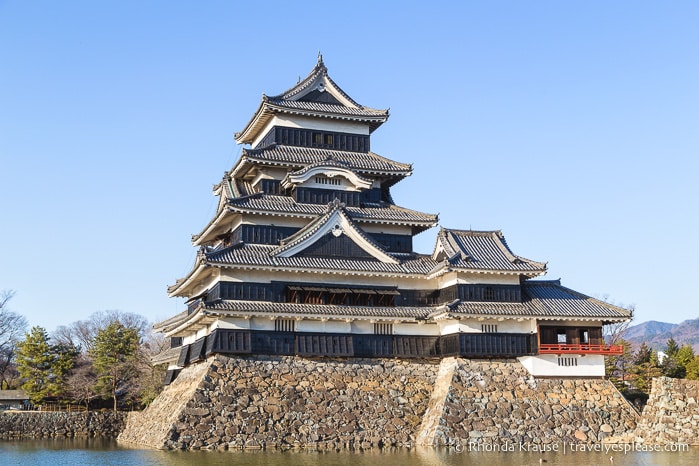
Day Trip to Matsumoto Castle- My Tour of Matsumoto Castle
I visited Matsumoto Castle as a stopover on my way from Nachisan to Nagano City. Since I had a Japan Rail Pass, I could get off the train in Matsumoto, then re-board to Nagano without having to pay for another train ticket.
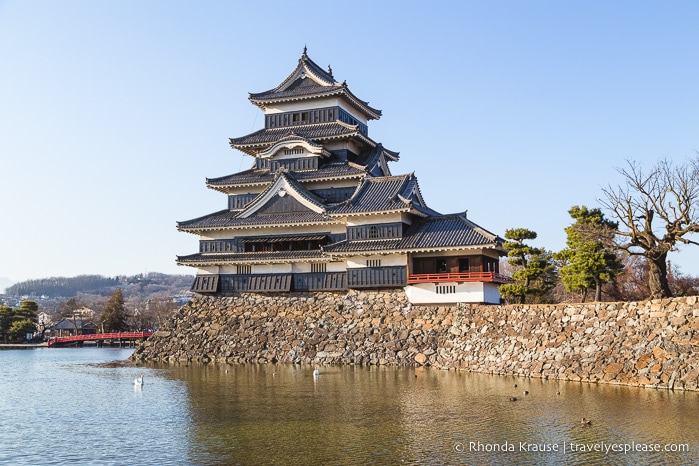
My excursion to Matsumoto Castle started with an easy 15 minute walk from the train station. As soon as I arrived at Matsumoto Castle Park, I was met with a gorgeous view of the “Crow Castle”, nicknamed so because of its black exterior.
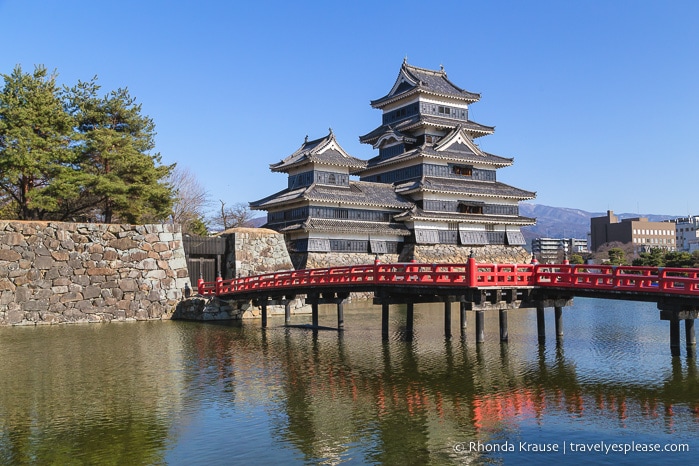
I spent some time photographing the castle from Uzumibashi Bridge, then walked alongside the inner moat towards the kuromon gate. Every step of the way Matsumoto Castle looked elegant and refined, making me forget it was a defensive structure built to fend off enemies.
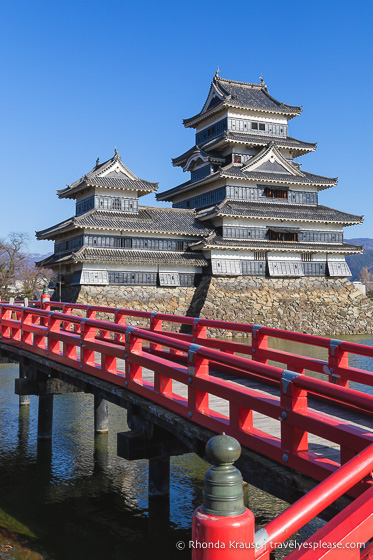
The views of Matsumoto Castle were ever changing during my walk between the bridge and main gate. From straight on, the castle loomed powerfully above the moat, whereas from the side it looked more delicate and tranquil, especially when backed by distant mountains and framed with manicured trees. No matter what the angle, Matsumoto Castle was always beautiful!
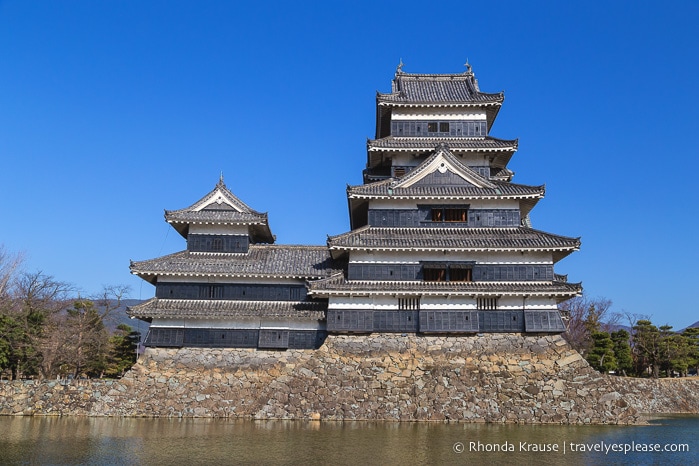
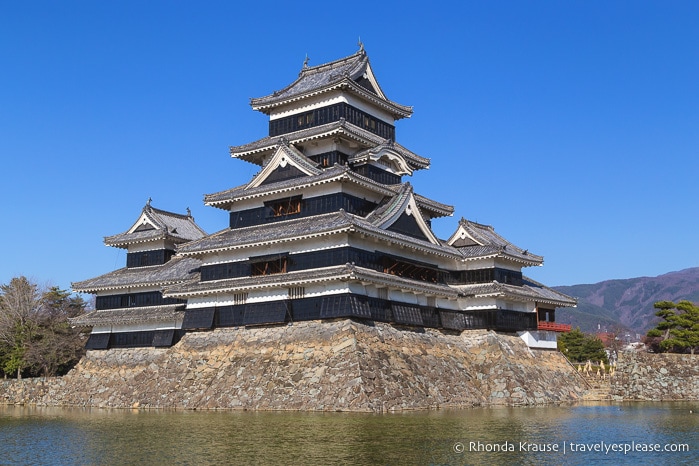
As much as I was captivated by its outward beauty, I was curious to see what was inside Matsumoto Castle. So, I made my way through the kuromon (black gate) and into the keep.
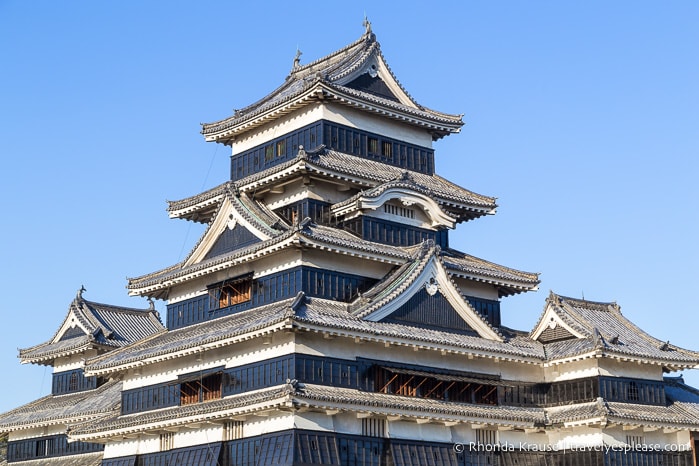
Matsumoto Castle was easy to visit without a guide because there was a set route to follow with plenty of informative signs and displays along the way.
The wooden interior was dark, with worn pillars, beams, and floorboards showing their age. I liked this authentic, “lived in” feel and could almost picture military officers and samurais carrying out their tactical plans.
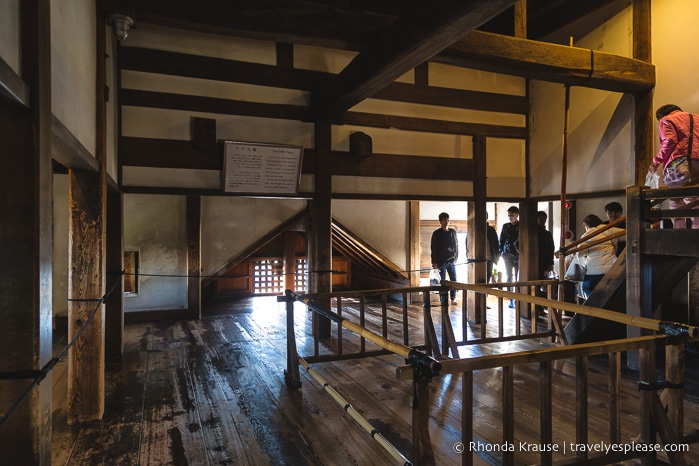
During my self-guided tour of Matsumoto Castle, I discovered that the donjon actually has six stories and not five, as it appeared from outside. The floors are connected by seven separate stairways with steep inclines between 55 and 61 degrees. I had to carefully navigate them to avoid slipping and bumping my head on the beams above!
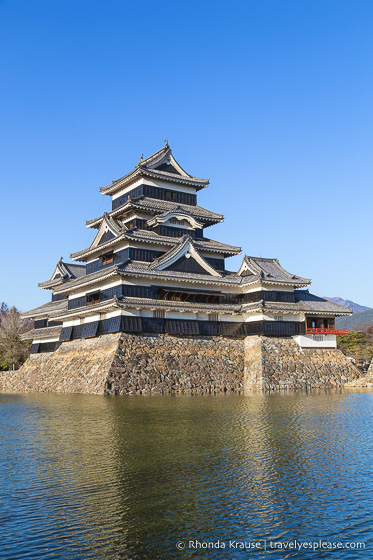
Each floor of the main keep had an interesting feature. On the first floor is the warrior’s running passage (Musha-bashiri), constructed to allow samurai in full armour to run around the interior and defend from attack by dropping stones, or maybe even boiling water, from the stone dropping windows.
The second floor has vertical lattice windows that warriors could shoot matchlocks through. The Matsumoto Castle Gun Museum is on this floor, so there are several types of guns and other battle equipment on display.
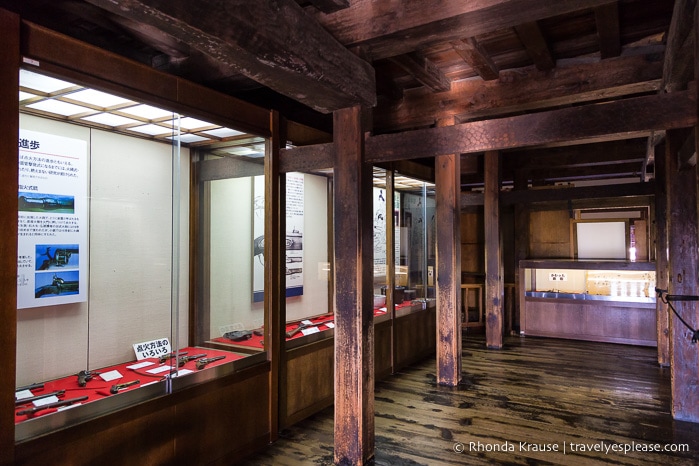
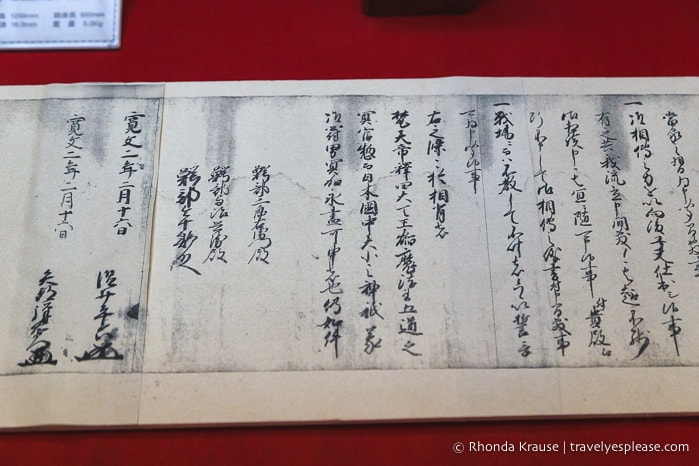
The third floor is the hidden floor. It has no windows and the walls are concealed behind the double layered roof. Since this floor can’t be seen from the outside, it was a secret to enemies and safe place for samurais to stay during wartime.
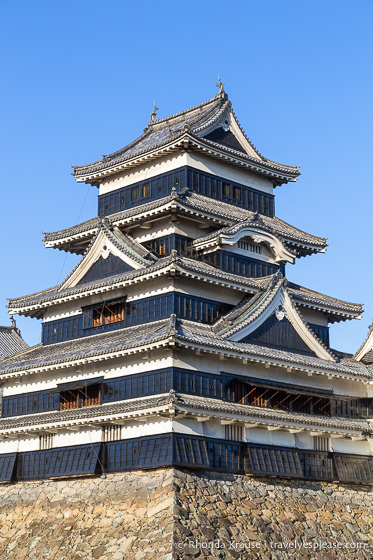
The fourth floor has the castle’s steepest staircase, at 61 degrees and steps 40 cm tall. With high ceilings and light entering from all four sides, it looked like a pleasant space for the lord’s private residence.
The fifth floor served as a conference room and has windows on every side that were used to assess the battle situation. All 30 pillars in the room are still original.
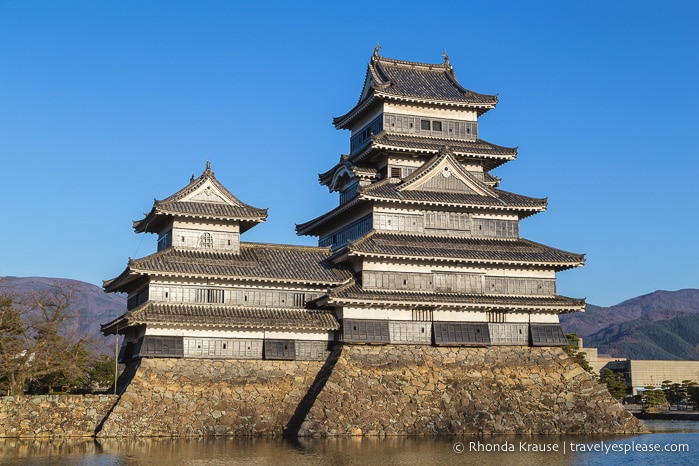
The sixth and top floor was used as a watchtower and has a dedication to Nijuroku-ya-shin, god of 26 nights, perched on the ceiling beams to protect Matsumoto Castle.
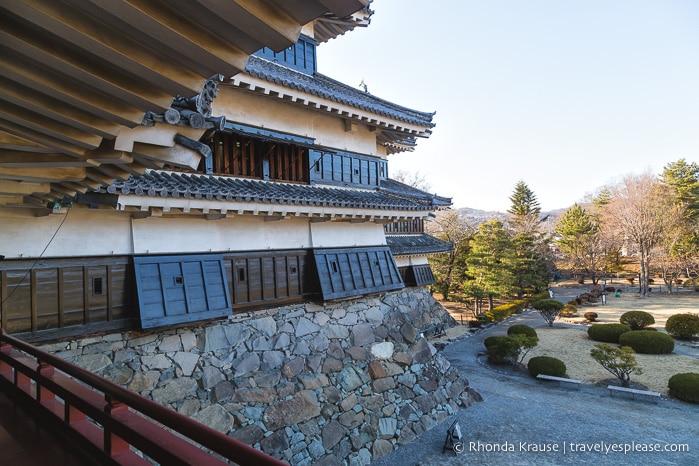
After touring the main keep, I concluded my tour by visiting one of the most special parts of Matsumoto Castle- the Moon Viewing Room. Matsumoto is one of only two castles in Japan that have a moon viewing room (the other is Okayama). The space has sliding doors that open to the east, north, and south so that people could admire the moon in comfort. There’s also a vermilion rail on the three open sides of the room.
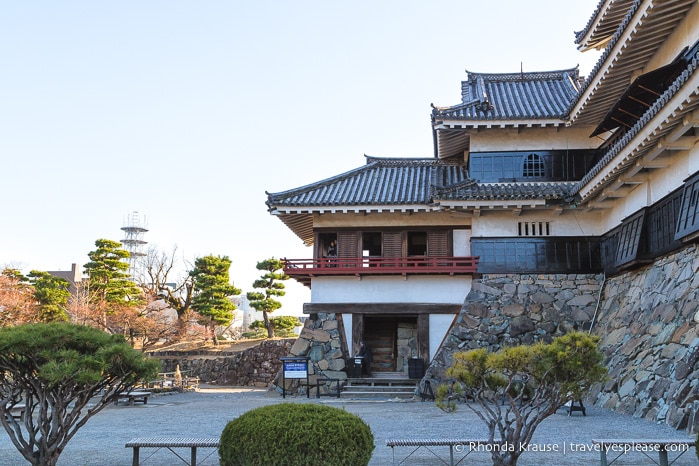
Final Thoughts About Visiting Matsumoto Castle
I very much enjoyed my tour of Matsumoto Castle and was glad I made a stopover to see it. The castle’s attractiveness was undeniable, but what I appreciated most was that much of it is complete and original, centuries after it was built.
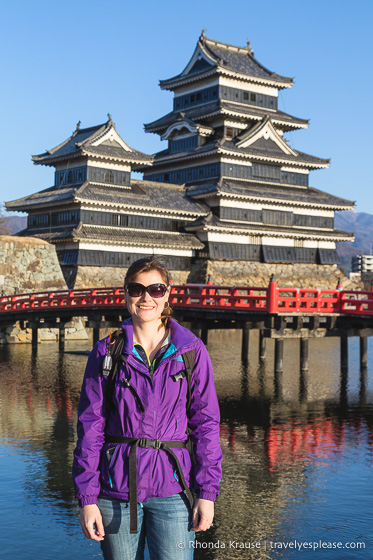
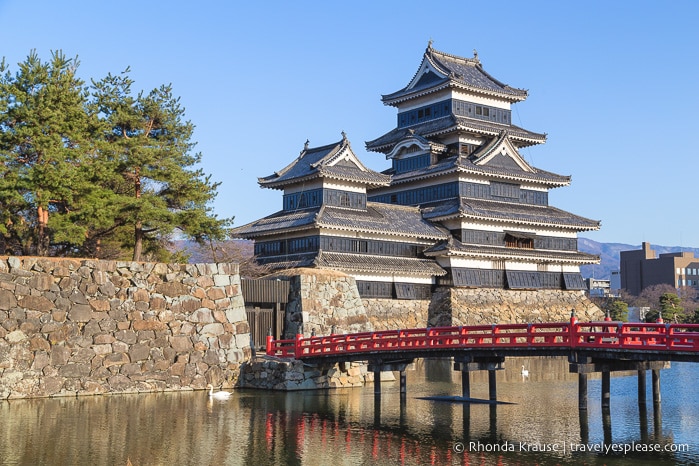
Unlike Himeji Castle, another of Japan’s original castles, there were interesting artifacts on display and bilingual signs that made it easy to learn and stay engaged during a self-guided tour of Matsumoto Castle. Some of my favourite exhibits were of the roof tiles, especially the pair of mythical sea creatures that were placed on the roof as protective charms (called Shachi).
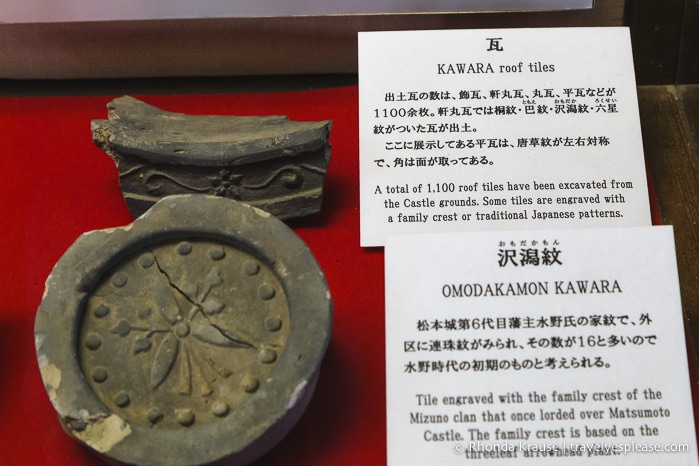
Another highlight of visiting Matsumoto Castle was looking out onto lovely views of the town and Japanese Alps from the tower. Can’t go wrong with views from above!
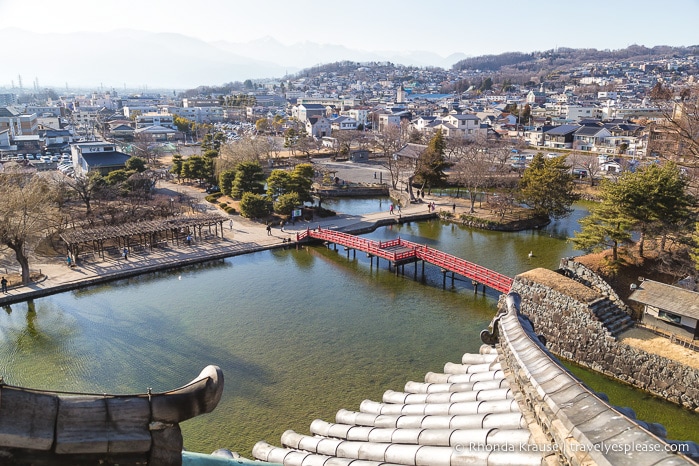
Tips for Visiting Matsumoto Castle
Location: Matsumoto Castle is located in Matsumoto City, in the Nagano Prefecture of the Chubu region of Japan.
Getting There: You can easily do a day trip to Matsumoto Castle from Nagano City, which is about a 1 hr train ride away. The Japan Rail Pass is valid for this route.
- Matsumoto Castle is a 15-20 minute walk from JR Matsumoto Station. You can also take the “Town Sneaker” bus (north course loop) that departs from Matsumoto Station and reaches the castle in 5-10 minutes.
Hours: Matsumoto Castle is open from 8:30 am- 5:00 pm (last admission at 4:30 pm). During Golden Week and the summer season hours are extended to 8:00 am- 6:00 pm (last admission at 5:30 pm). The castle is closed from December 29- December 31. Confirm current hours here.
Admission: Admission is 700 yen for adults.
Visitor Cautions: You have to take your shoes off inside the castle and will be given a bag to carry them with you during your tour. If in sock feet, be careful on the stairs because the wood is slippery.
- There are no elevators inside the castle.
- The castle gets very busy during Japan’s holiday seasons of Golden Week and Obon.
Information was updated January 2025, but can change without notice. Please confirm directly with the venue.
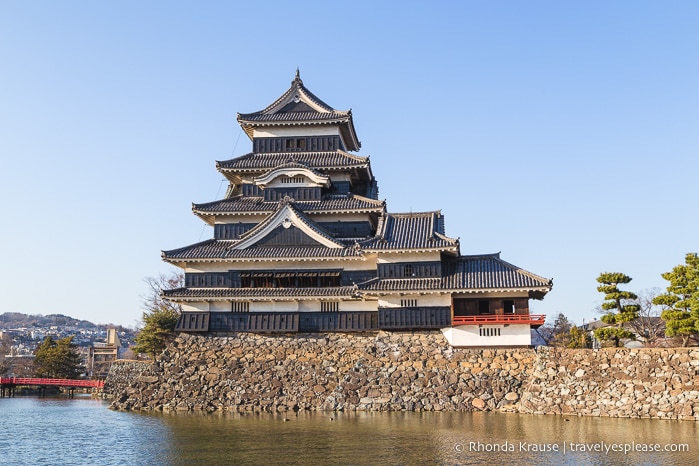
Accommodations in Matsumoto
For your convenience, here is a list of hotels in Matsumoto. Please consider booking your Himeji accommodations through the included link. It costs nothing extra and helps support this website. Thank you!
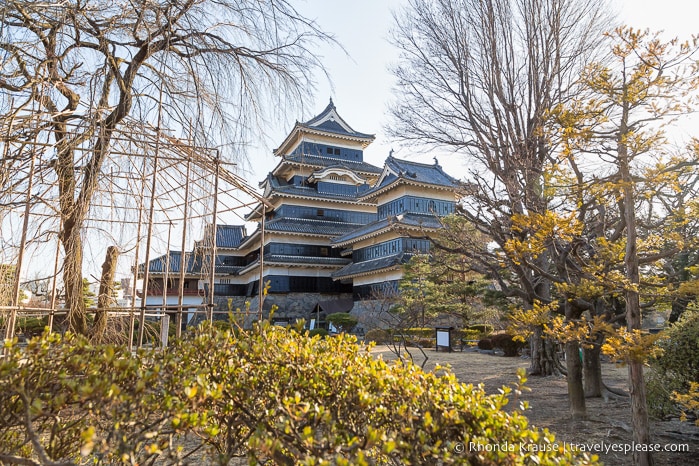
More Japan Destinations and Travel Guides
- Hiroshima Castle- History, Photos and Tips for Visiting
- Exploring the Fuji Five Lakes- Things to Do Even When You Can’t See Mt. Fuji
- Jigokudani Monkey Park- See Hot Spring Loving, Wild Snow Monkeys in Japan
- Beautiful Places in Japan- Scenic Spots to Visit

